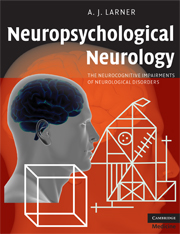Book contents
- Frontmatter
- Contents
- Acknowledgements
- Introduction
- 1 Cognitive function, neuropsychological evaluation, and syndromes of cognitive impairment
- 2 Neurodegenerative disorders
- 3 Cerebrovascular disease: vascular dementia and vascular cognitive impairment
- 4 The epilepsies
- 5 Neurogenetic disorders
- 6 Inflammatory, immune-mediated, and systemic disorders
- 7 Structural brain lesions
- 8 Endocrine, metabolic, and toxin-related disorders
- 9 Infective disorders
- 10 Neuromuscular disorders
- Index
- References
9 - Infective disorders
Published online by Cambridge University Press: 15 December 2009
- Frontmatter
- Contents
- Acknowledgements
- Introduction
- 1 Cognitive function, neuropsychological evaluation, and syndromes of cognitive impairment
- 2 Neurodegenerative disorders
- 3 Cerebrovascular disease: vascular dementia and vascular cognitive impairment
- 4 The epilepsies
- 5 Neurogenetic disorders
- 6 Inflammatory, immune-mediated, and systemic disorders
- 7 Structural brain lesions
- 8 Endocrine, metabolic, and toxin-related disorders
- 9 Infective disorders
- 10 Neuromuscular disorders
- Index
- References
Summary
The spectrum of infectious diseases causing cognitive impairment and dementia has changed over the past century. Whereas neurosyphilis was once common, now infection with human immunodeficiency virus and herpes viruses, and diseases caused by prions (see Section 2.5), are perhaps the most notable infectious causes of cognitive decline and dementia (Almeida & Lautenschlager, 2005).
Encephalitides and meningoencephalitides
Infection of the brain parenchyma with or without involvement of the surrounding meninges may be caused by a wide variety of organisms, most usually viral, but sometimes protozoan, rickettsial, or fungal (Anderson, 2001). Despite intensive investigation, a causative organism is not always found and treatment may of necessity be empirical, covering the most likely candidate organisms.
Encephalitis is often a medical emergency, requiring intensive supportive care and control of epileptic seizures. With the advent of antiviral agents such as aciclovir, mortality has declined considerably, leaving increased numbers of survivors who may have neuropsychological sequelae.
Encephalitides and meningoencephalitides covered elsewhere include Rasmussen's syndrome of chronic encephalitis and epilepsy (see Section 4.2.2), in which an infective aetiology remains a possibility, and chronic inflammatory meningoencephalitis, a term sometimes used for Sjögren's syndrome (Section 6.5).
- Type
- Chapter
- Information
- Neuropsychological NeurologyThe Neurocognitive Impairments of Neurological Disorders, pp. 204 - 214Publisher: Cambridge University PressPrint publication year: 2008



